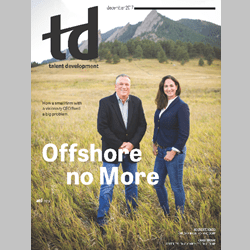TD Magazine Article
Large Variations Found in Asia-Pacific Employee Experience Scores
Highest and second-lowest global scores come from the region.
Fri Dec 01 2017
Bookmark
Although the financial crisis began nearly a decade ago, 62 percent of financial industry employees—people working in banking, insurance, and asset management—still feel the aftereffects. That's according to a new survey of more than 800 financial employees conducted by Future Workplace. It found that nearly one-third of them are interested in leaving the trade. Thus, it's time for the industry to update its employee recruitment and retention methods.
"Employees today care about competitive pay and benefits," says Dan Schawbel, partner and research director of Future Workplace, "but they also care deeply about flexibility, meaningful work, and choosing an employer that is a good corporate citizen."
When it comes to selecting a new job, 73 percent of financial employees want to know the organization's purpose and values. Furthermore, 52 percent want to work for a company with a strong philanthropic mission. As such, companies might want to consider donating to charity organizations with similar values, or offering employees time to volunteer during the workweek.
However, even the most generous companies risk losing employees if they fail to increase flexibility; 69 percent of financial service employees want more flexible scheduling and telecommuting options to keep them in the industry. That isn't surprising since 66 percent of these individuals report experiencing workplace burnout.
Financial companies that fail to accommodate the modern workforce risk losing valuable employees and institutional knowledge. They also risk diminishing their ability to compete for talent, and spending more than necessary on recruitment efforts. By promoting meaningful and flexible work environments, financial institutions can outcompete their peers when it comes to winning the talent war.

More from ATD
